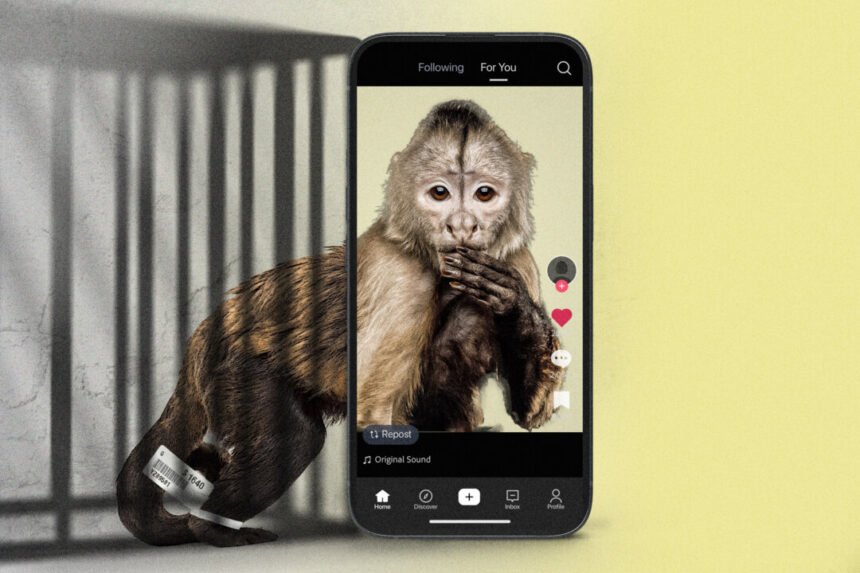Plail, a wildlife protection advocate, expressed her concern about the global trade in pet monkeys and primates, attributing it to greed and the influence of social media. She mentioned that the trend often starts with people seeing cute baby primates online and deciding they want one as a pet. However, she emphasized that these wild animals can become aggressive as they mature, leading to owners surrendering them to sanctuaries or abandoning them.
Ms. Plail highlighted the challenges of caring for adult primates and the high costs associated with housing them in sanctuaries. She also pointed out the role of social media in facilitating the online market for pet primates, which can be both legal and illegal.
Despite the risks and challenges associated with owning pet primates, the demand for these exotic animals continues to grow, fueled by social media influencers who promote them on platforms like TikTok and Instagram. However, critics argue that many of these influencers present a false image of the animals’ living conditions in order to gain likes, shares, and followers.
Ms. Plail stressed the importance of understanding the inherent social needs of monkeys and the potential dangers of keeping them as pets. She cited instances where pet primates have attacked their owners or others, leading to tragic outcomes.
In conclusion, she emphasized the need for responsible ownership of exotic animals and the importance of supporting sanctuaries that provide shelter for surrendered primates. She shared stories of rescuing adult vervet monkeys from irresponsible owners and highlighted the challenges faced by sanctuaries due to the influx of unwanted pet primates. Williams strongly believes that the online sale of pet primates is detrimental to the animals involved. She is against the idea of exotic pets being promoted on social media, as it often leads to impulse purchases by viewers who underestimate the challenges of caring for wild animals.
She highlighted the issue of pet owners abandoning their monkeys in sanctuaries after realizing the difficulties of proper care. Williams criticized social media influencers who exploit animals for likes and shares, pointing out the lack of enforcement in regulating such activities.
One influencer faced backlash for showcasing inappropriate treatment of his monkey on social media, prompting criticism from Williams. She expressed concerns about the safety of the animal and the potential risks it poses to others.
Despite complaints filed against the influencer, authorities have yet to take action, raising questions about the regulations governing the exotic pet trade. Williams emphasized the importance of responsible consumption of online content to prevent the perpetuation of harmful practices.
The exploitation of wild primates for social media fame is a dark aspect of the pet trade, as highlighted by animal welfare organizations. The prevalence of abusive behavior towards monkeys on social media platforms underscores the urgent need for stricter regulations and enforcement.
The disturbing trend of macaques being mistreated as pets on social media platforms has raised alarms among animal experts, who urge for better protection of these vulnerable animals. The significant evidence of abuse found in online content emphasizes the need for stricter laws, such as the Captive Primate Safety Act, to safeguard the welfare of captive primates. Williams highlighted the issue of conflicting state laws regarding the ownership and sale of monkeys as pets. In Florida, for example, possessing a wild vervet monkey requires a Class II license, 1,000 hours of primate experience, and two letters of reference. The Florida Wildlife Commission defines Class II wildlife as species that pose a threat to human safety.
In Arizona, macaques, apes, and baboons are prohibited as pets, while Georgia bans private ownership of apes, sloths, and monkeys. Some states have no laws regulating the sale or possession of nonhuman primates. Federal law defines nonhuman primates as members of the mammal order that includes prosimians, monkeys, and apes.
Advocates like Ms. Sinnott and Ms. Plail support the proposed federal Captive Primate Safety Act, which aims to ban the trade and ownership of nonhuman primates in the U.S. The bill includes species such as chimpanzees, gorillas, and monkeys, and is sponsored by Reps. Earl Blumenauer and Brian Fitzpatrick, as well as Sen. Richard Blumenthal.
Mr. Blumenauer emphasized the need to protect both primates and the public, stating that primates are not suitable as pets. The legislation seeks to establish a unified statute across all states to prevent loopholes and ensure consistency in regulating the pet primate trade.
Both Ms. Plail and Ms. Williams support the bill, emphasizing the cruelty of the pet primate trade, which involves separating infants from their mothers, causing trauma to both the mother and the baby. Can you please rewrite this sentence?
Source link





